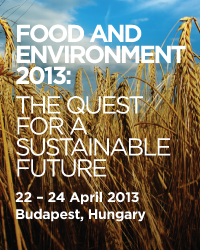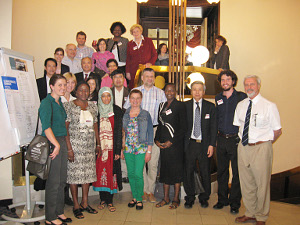2nd International Conference on Food and Environment
22 - 24 April 2013
Budapest, Hungary
Overview

The Second International Conference on Food and Environment, the Quest for a Sustainable Future, took place in Budapest, organised by the Wessex Institute of Technology and sponsored by WIT Transactions on Ecology and the Environment and the International Journal of Sustainable Development and Planning.
The meeting emphasised the effects of modern food production processes on the environment and human health, and discussed the best ways to provide food of the required quality, in sufficient quantities and in a sustainable way.
The many advances made over the past century in increasing the food supply have been achieved by the introduction of new practices and added substances, resulting in a series of effects, some of which are detrimental to the environment and human health. Contamination of air, soil and water from a variety of sources have contributed to these problems. Of particular importance are the effects on human health, the environment and a variety of ecological systems.
The Conference Chairmen were Professors Carlos A Brebbia and Viktor Popov, both of the Wessex Institute of Technology in the UK.
The conference was opened by Carlos who spoke of the objectives of the Wessex Institute in helping to disseminate knowledge, originally in the field of engineering, but most recently covering a wide range of scientific advances. Many of the conferences organised by WIT – Carlos explained – are of an interdisciplinary character, bringing together scholars and practitioners from many different fields. This is motivated by the need to find solutions to the problems affecting society, taking into consideration socio-economic and political aspects as well as multidisciplinary sciences. It is not sufficient, Carlos said, to find optional scientific avenues if they can not be implemented in practice.
Other activities of the Institute comprise scientific research in a variety of fields, including food sciences, as evidenced by an EU project recently completed, on the best solutions to determine contamination in the food sciences which led to the project, amongst other results, the development of new boxes for the transport of frozen products, such as fish.

WIT has developed new computational technology which has been incorporated in computer programmes now available throughout the world, mainly dealing with engineering problems such as those present in the oil industry, aerospace, automotive and many other mechanical engineering branches. The wider acceptability of the resulting software around the world is a source of special pride to the Institute as it validates the practical importance of its research.
Conference Topics

The papers presented at the meeting were grouped into the following topics:
- Impact of food production and food processing on the environment
- Policies and regulations
- Food production and climate
- Contamination of food
- Temperature control and traceability
- Pesticides and nutrients
- Food characterisation
Invited Presentations
In addition, there were a series of keynote addresses which helped to enhance the conference.
“The United States Department of Agriculture policies to improve school food quality while protecting the environment” by Shahla Wunderlich from the Department of Health and Nutrition Sciences of Montclair University, where she is Director of Graduate programmes and Dietetic Internships. Shahla has a PhD from MIT on Nutritional Biochemistry and Metabolism. The paper described local farm versus industrial food production. She also reviewed the US Government Programme and Policies regarding farming and food production. The initiatives are also related to trying to reduce obesity, particularly amongst young people, including programmes such as fresh fruit and vegetable programmes.
“Sustainability reports from the food industry: case studies from Europe and Latin America” by Roman Brandtweiner, Deputy Head of the Institute of Information Management and Control, Vienna University of Economics and Business. Roman has two PhDs, one in Economics and another in Media and Communication Sciences. He referred to sustainability reports being an important instrument for supporting company policies. They provide the company performance regarding economic, environmental and social aspects. The paper discussed reports from companies in the food industry.

“Climate change adaptation and food production in Canada: some research challenges” by Suren Kulshreshtha, University of Saskatchewan, Canada, where he carries out research on socio-economics of climate change and especially in water resources. Suren has a PhD from the University of Manitoba and is a Fellow of the Canadian Agricultural Society. His paper described how the climate change in Canada requires changes in production.
“An HACCP approach integrating quantitative microbial risk assessment and shelf life prediction” by Viktor Popov, Professor of Environmental Fluid Mechanics at Wessex Institute of Technology. The paper described a methodology to trace the life of food taking into consideration microbial growth.
“Environmental impact caused by fungal and particle contamination of Portuguese swine” by Carla Viegas, Professor at the Institute Polytechnic of Lisbon in Portugal. The paper dealt with the health hazards associated with workers in swine farms. Some fungi can affect lungs and part of the larynx, particularly below the vocal chords.
“Purification capability of broccoli to gaseous ethyl alcohol using an LED lighting system” by Takashi Oyabu, Kanzana University, Japan. The research described a novel method to grow vegetables using lighting systems resulting, in essence, in a plant factory.
“Potential poultry and meat products contamination by aflatoxin B1 due to fungal presence in Portuguese poultry units” by Susan Viegas, Institute Polytechnic of Lisbon, Portugal. The paper described the health hazards for those working in a poultry unit and how their respiratory systems can be affected.
Conference Dinner and ISAC Meeting

The conference dinner took place on a sightseeing boat cruising the Danube, and it consisted of a four course à la carte menu, accompanied by live music and excellent local wines plus other drinks. The boat cruise showed some of the most important sites of the town including the famous chain bridge, Margaret Island, views of the Royal Palace, the Parliament buildings, and many churches and places of interest along the route. It was a most enjoyable evening offering the possibility of making further contacts and strengthening existing links amongst the delegates.
Closing of the Conference
The conference was closed by Carlos Brebbia, who thanked all delegates for their contribution to the success of the meeting, and hoped that they would consider visiting the Wessex Institute at their convenience so that they can better appreciate the work being done there.
Conference Proceedings
The proceedings of Food and Environment 2013 - Food and Environment II, 272pp (Print ISBN: 978-1-84564-702-5; eISBN: 978-1-84564-703-2) are available from WIT Press. Orders can be placed on the WIT Press web site at www.witpress.com or by email:
Papers from the conference will also be hosted online at the WIT eLibrary as Volume 170 of WIT Transactions on the Ecology and the Environment (ISSN: 1746-448X, Digital ISSN 1743-3541). For more details visit the WIT eLibrary at http://library.witpress.com
Related Conferences


 Wessex Institute
Wessex Institute